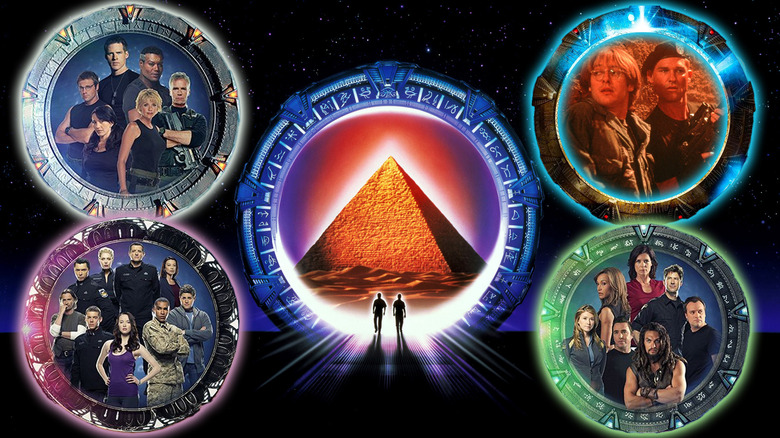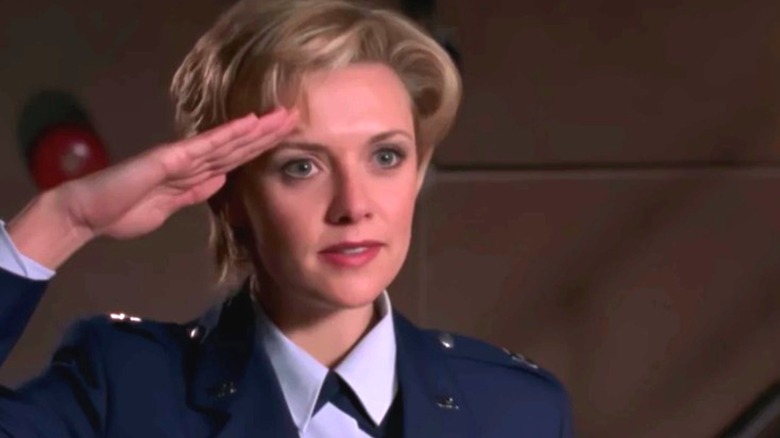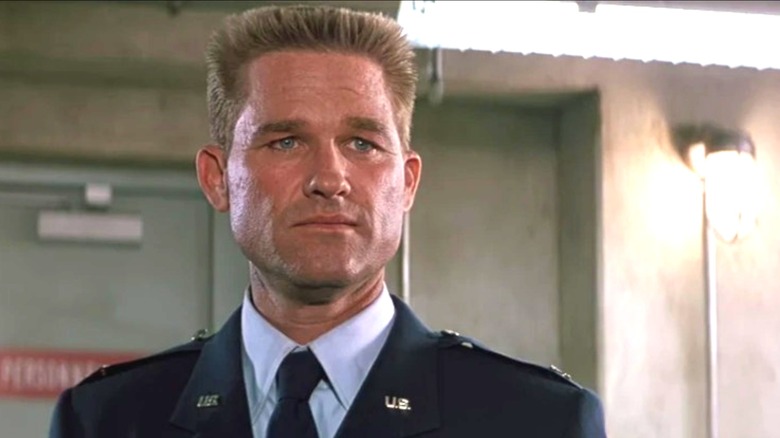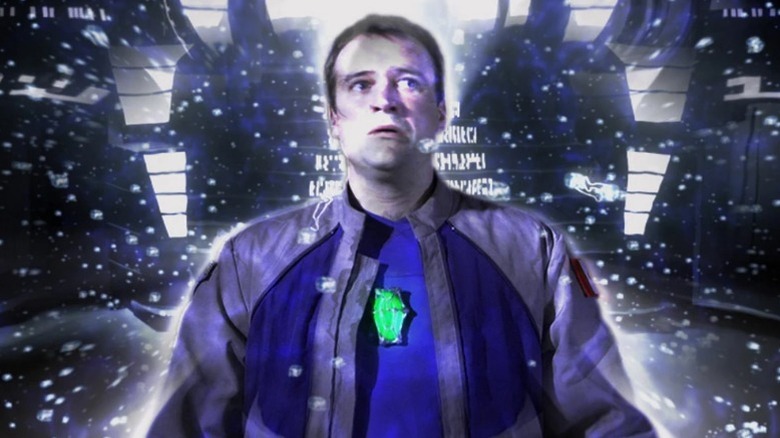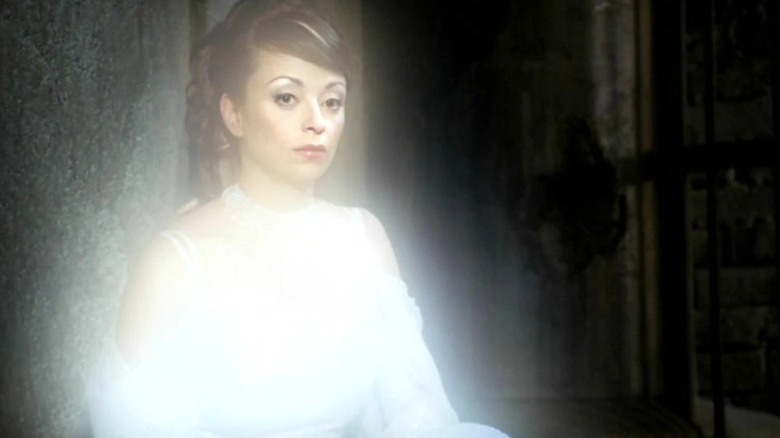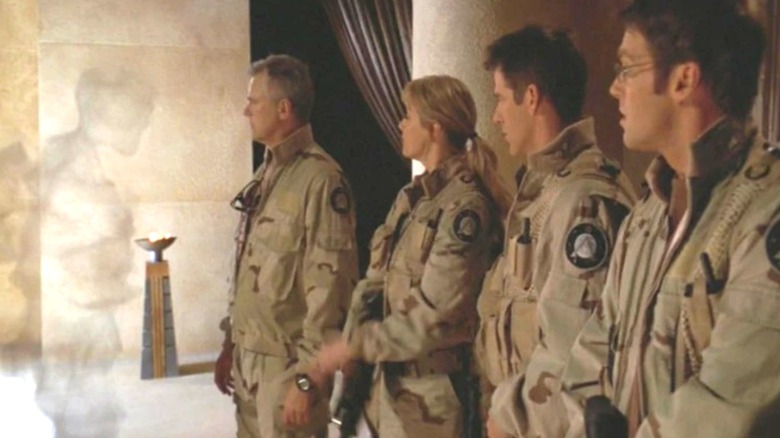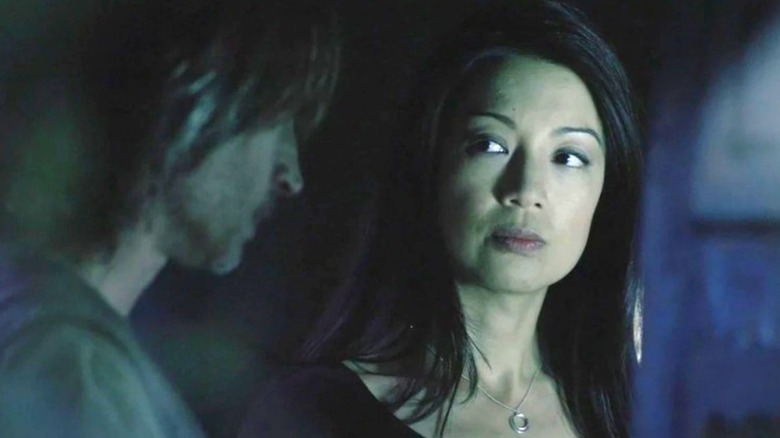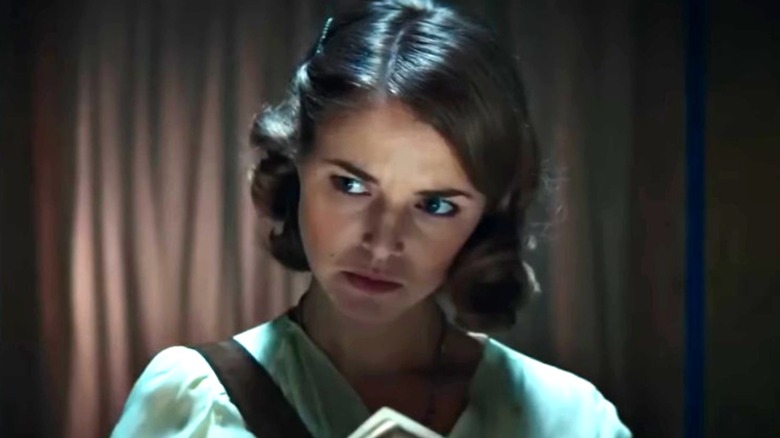How To Watch The Stargate Movies & TV Shows In Order
The "Stargate" franchise is among the most massive sci-fi creations of the past few decades in film and television. Following the adventures of various scientists and military personnel in a world transformed by the Stargate device, an Einstein-Rosen bridge-inspired portal that allows users to travel instantly between different points of the cosmos, the numerous "Stargate" films and TV shows have used the elasticity of that concept to touch on almost every possible variation of sci-fi storytelling, running the gamut from pulse-pounding blockbuster action to dense interplanetary political intrigue to meditative character drama about humanity's place in the universe.
If you're a sci-fi enthusiast looking to get into one of the genre's contemporary pillars, we've written out a handy guide to help you through the veritable mountains of "Stargate" audiovisual content. Watching everything can take you anywhere from a few weeks to multiple months or even years depending on your pace, but it will absolutely be a worthwhile experience.
Release order vs. ideal order
The "Stargate" franchise consists of one theatrical feature film, three live-action television series, two direct-to-video films, one animated series, and one web series, plus several tie-in video games and novels. What connects all of those works is the diegesis established by the Stargates themselves, along with the presence of the Stargate Program prompted by it. Not all of those works are considered canonical by the fans, but, in this article, we're going to be laying out a recommended viewing order for the entire "Stargate" film and TV franchise.
That viewing order differs somewhat from the straightforward release order — not least because there's overlap between two concurrently-released TV series, which should not be watched separately if you want to get the most optimized possible dive into the complete "Stargate" saga. That said, if your preference is to watch each "Stargate" film and series individually, in original premiere order, finishing one before moving on to the next, that is also a valid possibility. If that's your preference, this is the order in which they go:
- Stargate
- Stargate SG-1
- Stargate Infinity
- Stargate Atlantis
- Stargate: The Ark of Truth
- Stargate: Continuum
- Stargate Universe
- Stargate Origins
Now, over the next slides, you will find a more detailed viewing order that takes into account each film and series' place in the canon.
Stargate
It all began with the 1994 sci-fi blockbuster "Stargate." Written by Dean Devlin and Roland Emmerich and helmed by Emmerich in his sixth outing as a feature film director, the original "Stargate" movie begins with a 1928 prologue that introduces the discovery of a Stargate in Giza, Egypt. Then, in 1994, the story proper unfolds from the perspective of Dr. Daniel Jackson (James Spader), an outcast linguist and archaeologist who gets recruited into a U.S. Air Force expedition through the Giza Stargate. On the other side of the wormhole is Abydos, a remote desert planet inhabited by a human civilization with striking similarities to Ancient Egypt. Bombastic adventure ensues as the Earth team explores Abydos and learns that the Sun god Ra is actually a powerful humanoid alien (played by Jaye Davidson).
The movie introduces the concept of the Stargate, and lays the groundwork for the larger "Stargate" mythology that will be explored on the TV shows. It's also a reasonably fun and rousing '90s adventure flick. As such, 1994's "Stargate" is the ideal starting point for anyone looking to get into "Stargate." That said, fans and critics generally agree that the "Stargate" film is not as good as the shows, nor does it share the emphasis on heart that was the one rule that guided "SG-1." So, if you're in a rush to start "SG-1" already, the movie definitely contains enough lore and dramatic groundwork to enhance the show's experience, but, give or take a few mythology gaps that get smoothed out over the seasons, the show can still be enjoyed even if you skip the movie and go into it cold.
Stargate SG-1 seasons 1-7
After the success of "Stargate," the world created by Roland Emmerich and Dean Devlin was officially expanded into a franchise with "Stargate SG-1" — an idea that upset the movie's co-writer at first. Originally premiering on Showtime, where it stayed for its first five seasons before moving to the Sci-Fi Channel (since renamed Syfy), "SG-1" was created by Brad Wright and Jonathan Glassner. Its story begins one year after the events of the "Stargate" movie: Since the discovery and exploration of the portal to Abydos, the United States military has created a number of "SG teams" tasked with carrying out operations related to Stargate-enabled interstellar travel. The original team, SG-1, is led by Col. Jack O'Neill and Dr. Daniel Jackson, the protagonists of the original "Stargate" film, now played by Richard Dean Anderson and Michael Shanks.
"SG-1" was responsible for effectively taking a somewhat simple action-adventure romp with a nifty sci-fi premise and expanding it into a massive mythology spanning multiple millennia and galaxies; in that sense, it's the heart of the "Stargate" franchise. For its first seven years of existence, prior to the launch of the spin-off "Stargate Atlantis," "Stargate SG-1" was the only "Stargate" show on air. Therefore, once you've watched "Stargate," the movie, you can move right on to the 154 44-minute episodes that comprise Seasons 1-7 of "Stargate SG-1." In those episodes, you will find some of the most compelling feats of sci-fi storytelling of the '90s and early 2000s, as well as the bedrock for every subsequent addition to the "Stargate" lore.
Stargate SG-1 and Stargate Atlantis
On "Lost City," the season 7 finale of "Stargate SG-1," the team finds a hidden outpost of the Ancients (humankind's alien ancestors) underneath the ice of Antarctica. Following on from this setup, in 2004, Syfy debuted "Stargate Atlantis," a spin-off of "Stargate SG-1" created by "SG-1" co-mastermind Brad Wright alongside Robert C. Cooper. On the premiere of "Atlantis," Stargate Command uses the Antarctica outpost to get to the Lost City of Atlantis, an Ancient-built City-ship located in the distant Pegasus galaxy. "Stargate Atlantis" then follows the Earth team's acclimation to the very different culture and technology of Atlantis, as well as their conflict with a ruthless parasitic civilization known as the Wraith.
The first three seasons of "Stargate Atlantis" aired concurrently with the final three of "Stargate SG-1," with both shows informed by each other's continuity. There are several ways for a first-time "Stargate" viewer to negotiate this overlap. One way is to alternate between seasons, beginning with "SG-1" season 8. But the even better option is to alternate between episodes, starting with the "SG-1" season 8 two-part premiere "New Order," followed by the "Atlantis" two-part pilot "Rising." If you keep watching the equivalently-numbered "SG-1" and "Atlantis" episodes concurrently, as though you were following them weekly on Syfy (i.e. matching season 8 of "SG-1" to season 1 of "Atlantis," then season 9 of "SG-1" to season 2 of "Atlantis" and so forth, episode to episode, with the "SG-1" episode always coming first), you will glean the vast majority of the continuity. After all, that's the way the two shows were originally planned to be watched.
Stargate: The Ark of Truth
Even though "Stargate SG-1" concluded in 2007, the show's story was continued by two additional films, both released directly to home video in 2008. These films are not essential to keeping up with the final two seasons of "Stargate Atlantis" released after the end of "SG-1," so you can watch all of "Atlantis" and then go back to the "SG-1" sequel films if you're so inclined. To help the overarching "Stargate" story flow as seamlessly as possible, however, it's highly recommended that you intersperse your "Atlantis" viewing with "Stargate: The Ark of Truth" and "Stargate: Continuum."
"The Ark of Truth," in particular, takes place after the events of "SG-1" but prior to the events of the "Atlantis" season 3 finale. Therefore, if you watch season 10 of "SG-1" and season 3 of "Atlantis" alternating between episodes as suggested in the previous slide, you can put on "The Ark of Truth" right after you're done with the "SG-1" finale, and then finish season 3 of "Atlantis" after that.
A loftier production written and directed by Robert C. Cooper, "Stargate: The Ark of Truth" follows right on from the "SG-1" series finale and concludes the Ori arc of season 10. In the plot, the SG-1 team travels to the home galaxy of the Alterans in an effort to get their hands on the Ark of Truth, a device that may finally bring an end to the ongoing war with the Ori. Even after the movie, however, there remain loose ends to tie up in the "SG-1" grand narrative.
Stargate: Continuum
Following the release of "Stargate: The Ark of Truth" on March 11, 2008, another sequel to "SG-1" was released in direct-to-DVD movie form, this time on July 29, 2008. Written by Brad Wright and directed by Martin Wood, "Stargate: Continuum" leaps forward significantly from "The Ark of Truth" in continuity, and is best enjoyed if you watch it right after "Atlantis" season 5, episode 1.
In "Continuum," the Goa'uld System Lord Ba'al (Cliff Simon) carries out a last-ditch plan to avoid defeat: Going back in time to prevent the Earth's Stargate Program and Stargate Command from having ever existed. As a result, a new timeline is created, in which the lives of Daniel, Col. Samantha "Sam" Carter (Amanda Tapping), and Col. Cameron "Cam" Mitchell (Ben Browder) are radically different, while Ba'al has managed to instate himself as leader of the Goa'uld. As the only people in the world other than Ba'al himself who are aware of what happened, it's up to Daniel, Sam, and Mitchell to somehow correct the timeline back to its original status.
"Stargate Continuum" was successful enough to nearly prompt an ultimately canceled "Stargate SG-1" movie that would have been absolutely wild. Once you're done with "Continuum," you can move on to the remainder of the fifth season of "Stargate Atlantis." "Atlantis" was once intended to get a follow-up movie that could have changed everything, but it never materialized, meaning the season 5 finale, "Enemy at the Gate" (a.k.a. the show's series finale), is also the de-facto conclusion to the "Atlantis" plot.
Stargate Universe
After "Stargate Atlantis," the next work in the "Stargate" franchise you should watch is "Stargate Universe." Created by Brad Wright and Robert C. Cooper, this Syfy series premiered on October 2, 2009, and doesn't follow on from any story hook found on either "Atlantis" or "SG-1." Instead, "Stargate Universe" is very much its own thing — not only in its plotting, but also in its tone and artistic approach, which angle for a slower, more dramatic, more philosophical kind of sci-fi.
"Stargate Universe" follows a group of human explorers from the Icarus base who find themselves stranded on a massive unmanned spaceship. Built eras ago by the Ancients for a never-completed expedition, the Destiny ship is taking our heroes helplessly to the farthest reaches of the cosmos; "Stargate Universe" thus tells the story of the team's efforts to find a way home via Stargate.
It's a darker, more human story, focused on isolation and survival as opposed to big sagas of intergalactic political strife, with the "Stargate" mythology factoring in more incidentally and without any arch-enemies, which makes "Stargate Universe" a show that can be enjoyed even without prior knowledge of the "Stargate" ... um, universe. The two produced seasons are amazing enough to have left fans wondering what season 3 could have been like. If you love "SGU" a lot, you can also watch the 34 ultra-short tie-in "kino" webisodes originally released on the show's official website; they have since been made available on home media and on YouTube, and are lighthearted skits and lore additions that can be watched concurrently with season 1.
Stargate Origins
After "Universe," there was an almost a "Stargate" movie that would have brought every show together, but it didn't ultimately happen. Then, in 2018, the "Stargate" franchise was revived on the occasion of MGM's launch of Stargate Command, a streaming platform focused 100% on "Stargate" content. To promote Stargate Command, MGM commissioned an original "Stargate" web series to be released exclusively on the new service. The web series in question, "Stargate Origins," was created by Mark Ilvedson and Justin Michael Terry, and acts as a prequel to the entire "Stargate" franchise. All 10 episodes are written by Ilvedson and Terry, directed by Mercedes Bryce Morgan, and run 10 minutes long; "Stargate Origins" aired between February and March 2018, a few months after the launch of Stargate Command in late 2017. (The streaming service would ultimately shut down in 2019.)
There is debate among fans as to whether "Stargate Origins" counts as canonical. Its plot takes place 10 years after the prologue of the original "Stargate" film, and follows Catherine Langford (here played by Ellie Gall), the daughter of archeologist Prof. Paul Langford (Connor Trinneer), as she and her father embark on the first exploration of the planet Abydos through the Giza Stargate in 1938. No writers of any of the three live-action TV series are involved, very little on the show impacts the larger lore of the franchise, and the budget and production values are markedly lower than in previous "Stargate" properties. Even so, it was produced by MGM and slots into the "Stargate" continuity, so it's still worthwhile viewing for completists.
Stargate Infinity
There's one more "Stargate" series you can watch if you're staunch about crossing off the entire list: "Stargate Infinity." Created by Eric Lewald and Michael Maliani, this French-American co-production ran a single 26-episode season between 2002 and 2003, airing on Fox in the U.S. and on Disney Channel and M6 in France. It's the only animated series to have been produced in the "Stargate" franchise.
"Stargate Infinity" follows Major Gus Bonner (Dale Wilson), a disgraced former SG team leader who has been framed by the hostile Tlak'kahn alien race for going against orders and falling into an ambush that killed multiple soldiers. During a Tlak'kahn attack on Stargate Command, Bonner is able to escape through a Stargate along with a team of young recruits; he then proceeds to travel around the galaxy looking for evidence that might clear his name, in hopes of one day returning to Earth and restoring his former glory.
A low-budget, child-oriented production, "Stargate Infinity" is not considered part of the official "Stargate" canon, with Brad Wright having gone so far as to state that nobody in the "SG-1" production team had anything to do with it. Since the show has no bearing on anything else in the "Stargate" universe (as a case in point, it's one of the only "Stargate" projects not to feature Daniel Jackson), it's a pretty optional watch for anyone who wants to get into the franchise, which is why we're placing it at the end of the recommended viewing order. It's pretty much just a bonus for intense aficionados.
The Stargate behind-the-scenes specials
In addition to the fictional works within the "Stargate" world, there are several TV specials that can be viewed as supplementary material by fans who want to get a peek behind the scenes. 2003's "Stargate: The Lowdown" is a Sci-Fi Channel mockumentary hosted by "Stargate SG-1" stars Amanda Tapping and Michael Shanks that serves as a summary of the "Stargate" lore leading up to season 7 of "SG-1." In 2004, it was followed by "From Stargate to Atlantis: A Sci-Fi Lowdown," an introductory special to "Stargate Atlantis."
In January 2005, the Sci-Fi Channel aired "Sci-Fi Lowdown: Behind the Stargate – Secrets Revealed," a documentary preceding the midseason premieres of "SG-1" season 8 and "Atlantis" season 1. Then, in July of the same year, both "SG-1" and "Atlantis" were among the shows covered on the channel's "Sci-Fi Inside: Sci-Fi Friday" behind-the-scenes special. Months later, in January 2006, Amanda Tapping hosted "Stargate SG-1: True Science," a special diving into the science of "SG-1" prior to the midseason premiere of season 9.
The Sci-Fi Channel then aired "Sci-Fi Inside: Stargate SG-1 200th Episode," a special celebrating episode 200 of "SG-1," in August 2006. It was followed just a few months later by the anniversary special "10 Years of Stargate SG-1." Finally, 2007's "Behind the Mythology of Stargate SG-1" takes a deep dive into the construction of the "SG-1" lore and what made it so successful as an example of TV world-building.
The chronological viewing order
As in any other franchise with a dense mythology, there are viewers who favor the in-universe chronological order. Given that "Stargate SG-1," "Stargate Atlantis," and "Stargate Universe" are set more-or-less concurrently with the sci-fi alternate present introduced by the "Stargate" film, with the only works set at different points in the timeline being "Stargate Origins" and "Stargate Infinity" (which takes place 30 years after the film, i.e., later in time than all the live-action shows), the chronological order is almost identical to the recommended order laid out above. To sum it up, it goes as follows:
- "Stargate" prologue: Set in 1928
- "Stargate Origins": Set in 1938
- "Stargate": Set in 1994-1996
- "Stargate SG-1" seasons 1-7: Set between 1997 and 2004
- "Stargate SG-1" seasons 8-10 and "Stargate Atlantis" seasons 1-3 (save for the season 3 finale): Set concurrently between 2004 and 2007
- "Stargate: The Ark of Truth": Set in 2007
- "Stargate Atlantis" season 3 finale: Set in 2007, after "The Ark of Truth"
- "Stargate Atlantis" season 4, plus the season 5 premiere: Set between 2007 and 2008
- "Stargate: Continuum": Set in 2008, after the "Atlantis" season 5 premiere
- "Stargate Atlantis" season 5 (save for the premiere): Set between 2008 and 2009, after "Continuum"
- "Stargate Universe": Set between 2009 and 2010
- "Stargate Infinity": Set in the late 2020s
Still, there's little reason to watch "Stargate Origins" before the rest of the franchise, so we'd still suggest you stick with our recommended order.
